皮皮蝦
Will update later on.在美国这个标榜人权平等的国家仍然存在着许多不尽如意的地方,最为人诟病的就是亚裔在升学、工作上都面临着比其他种族要高的标准-俗称亚裔税。
最近发生的两件事情在亚裔中引起了很大的反响。一件事是起诉哈佛歧视亚裔的案子在司法部的要求下,哈佛被动交出的内部文件中发现了对亚裔学生明显的歧视证据:在一项称作个人特质评分上,比如正面性格(positive personality)、可爱度(likability)、勇气(courage)、善良(kindness)、被广泛中尊重(widely respected)等方面,大学的录取官看到亚裔名字都没有见过面就直接打低分,还做出各种贬低的评价。而校友面试里,亚裔得分并不低。
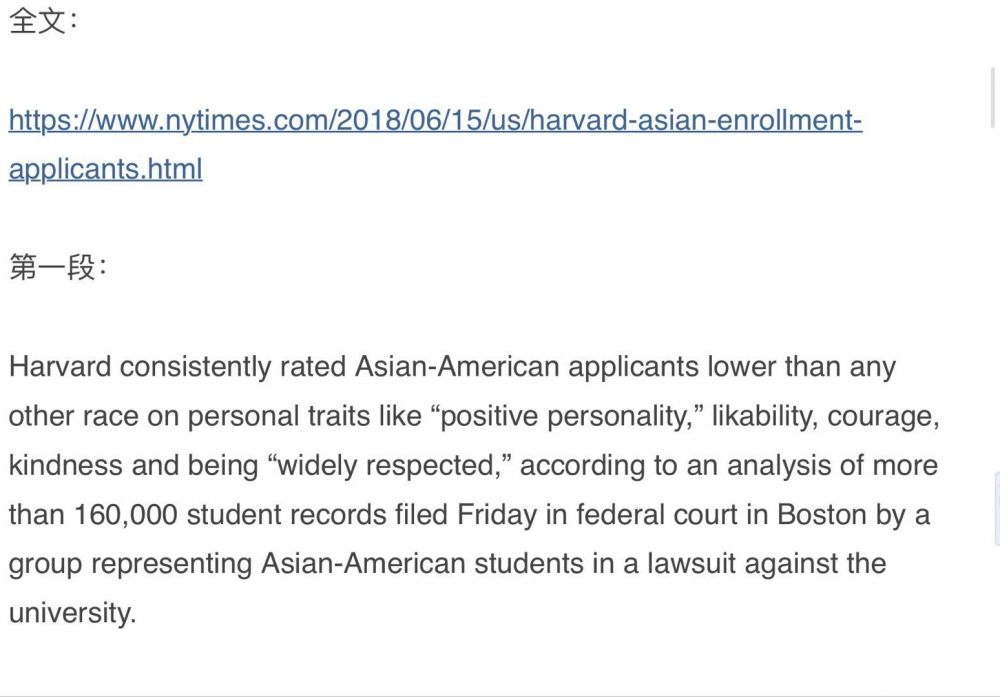
另一件事情是纽约市长白思豪最近宣布要改革纽约顶尖的公立高中(八所特殊高中)的录取方式,以增加拉丁裔和黑人的比例、减少华人的比例。这引起了许多华人的游行抗议。
其实几年前,纽约教育局长就曾经说过,纽约的这几所明星高中,每年出这么多的英特尔科学奖获得者、奥林匹克学术奖得主,这是我们纽约的耻辱。(这是教育部长说的话,荒唐不?)。
他还说有些孩子为了考明星高中提前两年准备考试。有一位白人专栏作家质问道:这些提前两年准备考试的孩子们好多都来自开餐馆、洗衣房的低收入的家庭,问题是谁阻挡了那些拉丁裔和黑人的孩子提前准备了呢?
看到亚裔孩子只有白人孩子一半的几率被哈佛大学录取,纽约特殊高中Stuyvesant的副校长Casey Pedrick哭了起来,她哽咽地说:
"These numbers make it seem like there's discrimination, and I love these kids and know how hard they work," she answered, when asked why she was upset. "These look like numbers to all of you guys, but I see their faces."
(当被问及为什么她沮丧时,她回答道:“这些数据似乎显示出就是有歧视,我爱这些孩子,并且知道他们多努力。对你们来说这些看上去就是些数字,但我却看到的是他们一张张的脸。")

因应这个热点话题,上周五(6月15号),左媒旗舰《纽约时报》一位叫做John Eligon的记者电话采访了本虾的朋友Tony Xu。据Tony讲,采访他也是因为需要不同观点的平衡,他是被相反意见的朋友推荐给记者的。
Tony是上海交大毕业生,现在是硅谷极成功的房地产经纪人。当天,他在朋友圈记录了提问的主要内容,经Tony同意,本虾将他在朋友圈的分享原封不动转在这里:
------------------------------
今天接受了左媒旗舰纽约时报记者John Eligon的电话采访。希望正式的报道不会歪曲我的观点。
下面是主要提问内容。大家到时验证看看是否有歪曲。:)
1)是我对AA的看法。我先确认语境,AA是指race base AA。确认后,当然是反对。
2)他问是否知道历史上少数族裔被迫害。我说当然知道,但现在并不存在系统性的种族歧视,要有就是这个Race based AA,我认为是target亚裔。
3)他问知不知道实际上更不公平的legacy入学,为啥没人组织反对。我说我也反对legacy system,如果你组织一个反对legacy的,我也一定支持你。
你反对A与B。不能说你反对了A,就必须支持B吧。这两个不矛盾啊。你问我是对race base AA看法。我反对。你问我对legacy的看法,我也反对。不能说我反对legacy就要支持AA吧。
4)他说为啥没人组织反对legacy。我说你就可以组织一个啊。我一定支持。[呲牙]
5)他问为啥反对AA,首先我clarify,AA是指race base AA。如果social economic AA,我也支持,underprivileged kids derserve having preference. If they are given equal resources, they may achieve better。但是race shouldn't be a factor.
我举了奥巴马的女儿与唐人街洗盘子的小孩的例子。我问他你认为唐人街洗盘子家庭的kids是否应该give the spot to obama‘s daughter。而现实就是这样,你认为公平吗?
他说大学入学不光考虑academics,还有其他因素。我是inside the race,they use the same criteria。SAT高的与SAT低的,还是录取高的。between race才有区别。
我说hispanic与african american也有millionaire与billionaire,你认为他们应该比亚裔poor kids受到优待吗?
6)他问少数族裔是否应该团结,亚裔反对AA是否会造成不团结?我说不会。把这个操作成族群对立,不就是政客与media故意做的吗?
我们并不反对social economic AA,只是反对race AA。弱势团体应该得到社会的帮助。把他归结于族群对抗是政客与你们media简单化操作。我说我相信每个race都有聪明的kids,都可以在不考虑肤色的情况下得到成功。你应该不会认为african american kids less smart吧。[呲牙]
7)他问你对现在police brutality 怎么看,你是否认为有对black people的歧视。我说这个问题我没有研究,无法评论。但是我认为美国今天没有系统的歧视。我在马路上遇上警察,并不害怕。当然每个人的mind里是否有,这我不敢说。
8)他问了我一些个人情况,包括我女儿11年级。还问我什么时候参与政治。我说2014年sca5。之前并不关心。
他说你来美国20年,为啥就最后4年,才involve。我说教育是我们no1 issue。我们突然发现我们被target了,所以可能suddenly awaken。
他说prop 209你们为啥没有引起注意。我说prop 209,亚裔是受益者。
9)他说有民调显示大部分亚裔仍然支持AA。我说我不知道这个民调怎么做的。与我身边的情况不一致。当然我可能在我的echo chamber里。

10)他还问你认为college应该diversify吗,单一race合理吗?我说what‘s wrong with that. 中国的大学全是chinese,日本的大学全是japanese,德国的大学全是german。这有啥问题吗?As long as they are well qualified,what’s wrong with that? race shouldn’t be a factor to put into consideration.
我问他,你不会认为hispanic american kids,afraican american kids不考虑race就不能qualify吧。[呲牙][呲牙]
11)结束的时候,我重申,反对race AA,支持social economic AA。
------------------------------------------
第二天(6月16号),《纽约时报》发表的文章似乎还是有不少断章取义。Tony的话被放在最后一段。Tony告诉本虾,44分钟的interview,就这么一小段,很长一段时间是在讨论legacy,但他没提。
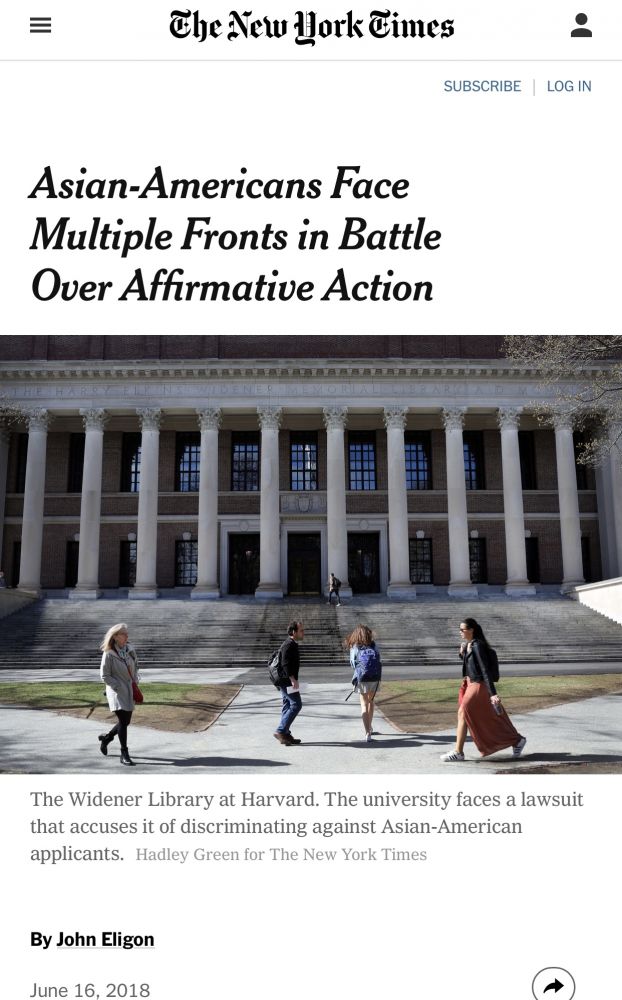
6月20号,《纽约时报》又发了中文版,文学城随即将中文版也快速登出了。本虾将中英文原文附在文末供大家参考。
本虾曾先后将上面Tony的11条和英文版的文章发在一个小群里,引起了一段很有质量的讨论。其中有一位朋友的想法系统有见地,经他同意,本侠整理了以后,也发在这里供大家评议。由于群里发言是流动对答式的,顺序逻辑上不太流畅,本虾就作了些调整。希望没有把原意拧了。
首先,他看了转的文章认为,Tony说中国、日本、德国的大学都是单一民族,好像正文中把德国省去了。另外,Tony问记者是不是觉得非裔、拉美裔就没有聪明孩子,可以通过正常竞争上大学的话,好像也省去了。本虾不知道是记者有意的还是水平不够漏记了。
下面是这位朋友对这个话题的整体看法:
-----------------------------------------
第一,不管是不是私立学校,透明公平是必须的。这是文明社会商业规则的基本原则。不管私立机构想多任性的定自己的规则,规则也要公平透明,能够被公开监督,经得住社会普遍法律和规则的检验。私立学校可以定义自己的公平,但要接受社会的监督和挑战。这和公司要受社会监督,老板不能随便欺压下属,没有本质区别。一个私立二字不能成为逃脱社会规则和法律的护身符。否则公司里还有任何法律的空间么?证券法还有存在的必要么?
私立教育机构怎样招生,本来应该有很大的自由。但是透明和公平却是必须的。否则就是商业欺诈,类似证券欺诈,这是商业法的基本原则。现在这些名校怎样招生都不是最重要的。最重要的是过程太不透明,公平也无从监督。其实他们只要公开透明公平的划下道来,进不去的人也自会服输。他们如果划的道太扯,大家也可以公开理论。现在这样就是一副居高临下,扮演上帝的样子,谁都烦他们。
学校招生考虑学生的背景是非常合理公平的做法。但是这些考虑,标准,算法,各种道道要公开透明。这是关键。他们觉得这样做是对的,就让所有人知道看到他们具体怎么做的。不服气的可以来公开理论,不是像现在这样藏着掖着。

第二,学校的目的和服务对象,私立机构的确有巨大的自由空间,并且应该得到一定的保护。比如希伯来大学应该没人会去告他歧视。如果华人搞个孔子大学,中文必修,也不能说歧视。但是还是那个透明公开。人家希伯来大学看名字就知道是给犹太人开的。现在很多私立名校,非盈利,拿着大把政府经费和社会捐赠,还收着天价学费,号称服务全人类,在政商各个公共服务领域深度介入,应该说已经成为了最重要的公共服务机构,还有什么享受私营保护的资格?结果连最基本的透明公平,接受公开监督都不肯实行,岂不是有挂羊头卖狗肉的嫌疑?
其实美国名校招人唯亲是公开的,所谓 legacy applicants。但是即使这样也要有个公开透明公平的道划出来啊?关于legacy,我只想问一句,小布什和特朗普的母校真的觉得为他们而骄傲么?
老实说小布什,特朗普都是些不合格招进去的学生。这基本上都是公开赤裸的不公平特权。但是在美国根本没有人敢于公开挑战这种公开透明的腐败特权,只好在穷人里抢名额,吵分数高低。
[虾注:华人对legacy没有特别挑战,缘于专制文化和奴性,对等级性天生有习惯性顺从]。
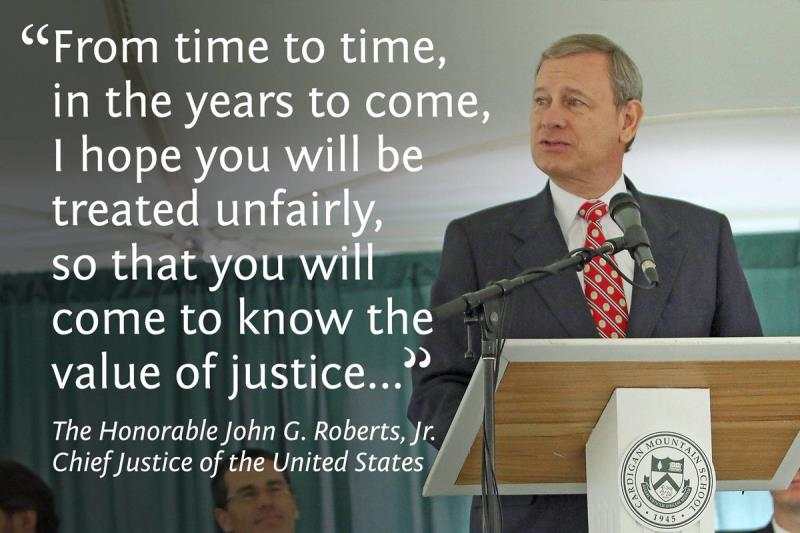
我说的教育的基本目的和理想。私校只要号称自己在搞教育,想搞好的教育,就不能不面对教育的意义和目的这些基本问题。何况私立学校开门做生意,就必须受公开透明这些基本商业原则的制约。
所以我还是那句话,私立学校想怎么玩都行,但是你的基本社会责任和义务是:公开透明你的玩法,看看你的玩法经得住社会公义,法律,和阳光的检验否。从这次官司哈佛对自己文件保密性的拼命维护来看,我很怀疑他们有这个自信。
所以我很高兴看到现在这个案子的进展对招生透明有很大的促进。而且我个人一向支持这种司法挑战。如果我有那个能力资源或者机会,我还会更多的参与这些努力。
这个组织和官司都不是华人自己在搞。上次打到高院的原告是白人,这个组织创始人也不是华人。所以(有些华人)不用急着害臊。
其实老实说,这种透明公开阳光化,受益最大的还是这些教育机构本身。否则他们迟早毁于自身的腐败。高等教育机构里招生只是问题的冰山一角了。教学质量,研究生制度,经费管理和使用方法,科研潜规则,教授评定,到处都有问题,都在滋生腐败。这些知识界的腐败问题一旦积重难返,整个人类的知识经济和相伴的资本主义体系都可能会彻底崩盘。这些年出现的各种泡沫,危机,以及科学问题的政治化,都多少体现着现有知识界的一些深层次问题和挑战。
我个人觉得所谓藤校系统和文化 is against everything the true good education is really about. 完全是一种二战后暴发户新贵的土豪文化。一副我牛我就是要任性的样子。教育的目的是要服务社会,让尽量多的人得到尽量多的知识,机会,和能力。教育的目的不是要扮演决定别人命运的上帝,把人分三六九等的过滤器,控制社会的工具,或者大把赚钱的摇钱树。教育是要努力提高人类整体素质,提高人们合作的能力和意愿,让世界整体有更多机会改进自己,让个人也有更多机会改进自己。如果说过去教育资源的稀缺让这些美好理想受限,现在人类正第一次拥有几乎无穷的教育资源来实践这些美好理想。这种历史的路口,任何教育机构甚至国家,社会如果选择捍卫守旧的特权,必遭历史车轮的碾压和惩罚。
--------------------------
附:《纽约时报》中英文原文
说明一下,本虾认为,文中"平权运动"的译法不恰当,易引起误读,应该译为"强制优待政策"。另,本虾补译了《纽时》漏译的四段,用 [虾译:....] 标明。
Why affirmative action is a complicated issue for Asian-Americans
平权运动下,亚裔美国人的挣扎与分裂
JOHN ELIGON
New York Times, June 16, 2018
翻译:纽约时报中文网 2018年6月20日
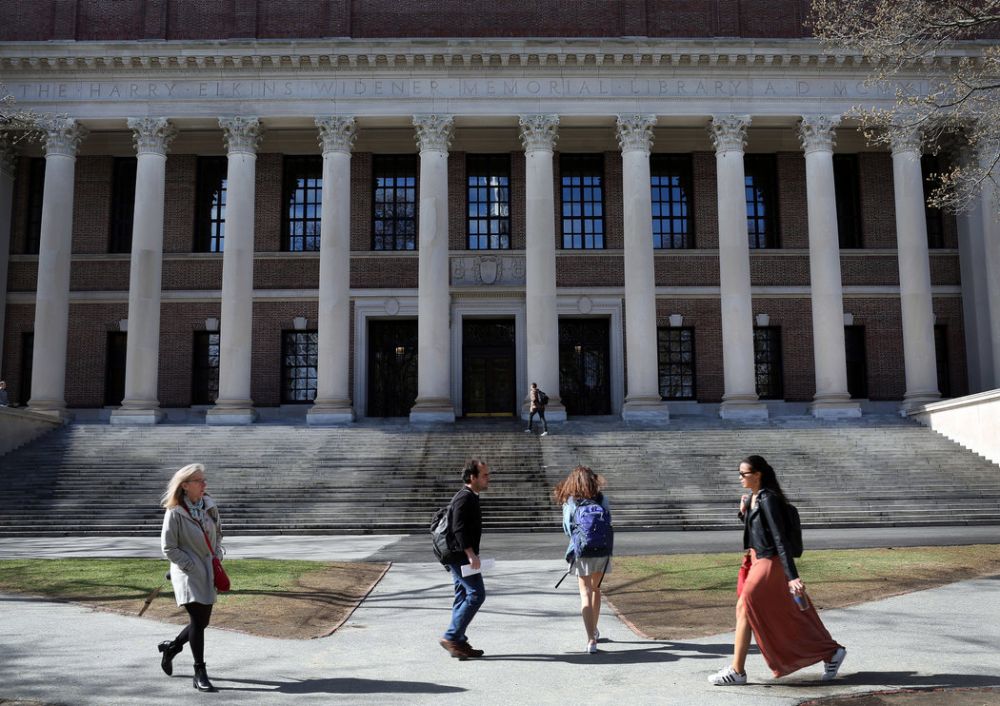
The Widener Library at Harvard. The university faces a lawsuit that accuses it of discriminating against Asian-American applicants. Hadley Green for The New York Times
哈佛威德纳图书馆。该校正面临一项歧视亚裔美国申请人的诉讼。
Between her pricey private tutors and SAT camp, Julie Yao knew that her education meant everything to her Chinese immigrant parents. She sensed their concern that because she was Asian, she would be judged by higher standards when applying to college.
来往于昂贵私人教师和SAT训练营之间的朱莉·姚(Julie Yao)清楚,自己的教育对她的中国移民父母来说意味着一切。他们认为,因为她是亚裔,大学会以更高标准来评判她。
But Yao, who was 14 when the family moved to the United States from Shenzhen, also came to appreciate the struggles of racial minorities in America through what she learned from textbooks and friends. She saw firsthand how black and Latino classmates who did not have some of the educational and economic privileges she did were just as studious and successful.
但14岁就和家人一起从深圳搬来美国的姚,从课本和朋友身上已经学到了美国少数族裔的斗争。她亲眼看见,那些教育和经济条件不及自己优越的黑人和拉丁裔同学,也可以一样勤奋和成功。
Yao, now 21 and a junior at Barnard College, grew to support affirmative action. Test scores, she believed, were not the only measure of academic potential.
现年21岁的姚是巴纳德学院(Barnard College)的大一新生,已经是平权行动的支持者。她认为,考试成绩并非衡量学术潜能的唯一指标。
“On the other hand,” Yao said, “I have all this information from Asian parents, the older generation, saying how it’s discriminating against Asian-American children.”
“但是在另一方面,”朱莉·姚说,“我的所有信息都来自我的亚裔父母,上一代人,他们说这是在区别对待亚裔美国小孩。”
Yao’s internal conflict reflects a broader ambivalence among Asian-Americans over not just affirmative action but also their place in the American racial order.
姚的内心挣扎反映了广泛层面上的亚裔美国人的矛盾心理,不只是对于平权行动,也对于他们在美国种族秩序中的地位。
A lawsuit that accuses Harvard of systematically discriminating against Asian-Americans in admissions, as well as a proposal to change the way New York City’s specialized high schools admit students, have brought new attention to fault lines in the racial politics inside and outside the country’s diverse Asian communities.
就哈佛大学录取过程中对亚裔美国人的制度歧视发起的一项诉讼,以及一项改变纽约市特殊高中招生办法的提议,再一次把人们的注意力转移到了多元的美国亚裔群体内外的种族政治断层。
Asian-Americans have been among the most vocal and visible opponents of race-based affirmative action policies, creating a popular perception that they are at odds with black and Latino people, who remain underrepresented in many elite educational institutions. But that framing obscures the reality of national surveys that show that most Asian-Americans favor affirmative action in education. Many find solidarity with other minorities.
对于以种族为基础的平权运动政策,亚裔美国人一直是声音最高、最为显著的反对者,这让人们普遍认为,他们与许多精英院校内仍属弱势的黑人和拉丁族裔是存在不和的。但这样的假象却遮蔽了全国性调查的事实——大部分亚裔美国人都支持教育平权运动。许多人认为自己和其他少数族裔是一个共同体。
Still, the various generational, geographic and socioeconomic backgrounds of Asian-Americans have contributed to rifts in how they approach their most pressing issues.
然而,不同世代、地域和社会经济背景的亚裔美国人,在最为紧迫的问题上有着不同的看法,从而导致分裂。
Southeast Asian communities, for instance, have high rates of poverty, and their interests often align with black and Latino communities on affirmative action and other social justice causes. South Asians, however, are among the highest earners and educational achievers; they are also strong supporters of affirmative action. They report experiencing more discrimination than other Asians in the United States.
例如,东南亚裔群体贫困率高,在平权行动以及其他社会正义问题上,他们的利益往往与黑人和拉丁裔群体一致。而调查中显示往往不被视作亚洲人的南亚人口,则是有着最高收入和教育成就的群体之一,他们也是平权运动的坚定支持者。他们反映,自己比美国其他亚裔人口受到了更多的歧视。
Meanwhile, some of the most fervent activism against affirmative action comes from a growing movement of recent first-generation Chinese immigrants, academics said. They have found their political voice in the past few years in battles over education, the conviction of a Chinese-American police officer in a shooting in New York, and proposals by different states to compile demographic data on Asians by country of origin.
但与此同时,有学者称,反对平权运动最激烈的呼声,有一部分来自近年的第一代中国移民日渐兴起的运动。在近几年围绕教育展开的争斗中,在纽约一名华裔美国警察因枪击被定罪的案件中,以及一些州根据原属国对亚裔人口数据进行分类整理的提议,让他们找到了自己的政治声音。
Much of their advocacy boils down to concerns that they face double standards in American life. But some Asian-Americans worry that they might appear to be providing cover for causes that run counter to minority interests. They find themselves trying to protect their own stakes but not at the expense of other groups’ interests.
他们的大部分主张都可以归结为对美国生活中所面临的双重标准的担忧。但有些亚裔美国人担心他们被人当成了幌子,用来掩盖那些与少数族裔利益背道而驰的运动。他们发现自己需要在不牺牲其他群体的情况下,保住自己的利益。
“We are slotted into this middle position that a lot of Asian-Americans sort of feel comfortable thinking that ‘I’ll be a colorblind person,’ which really means, ‘I’ll swear fealty to the white supremacy,’” said the author of the “Ask a Korean!” blog, who goes by the pen name T.K. Park.
“我们正处于这样一种中间位置,那就是许多亚裔美国人似乎觉得‘我就当个色盲’没什么问题,这句话的真正意义是,‘我宣誓效忠白人至上主义’,”以T·K·朴(T. K. Park)为笔名的“Ask a Korean!”(去问韩国人!)博主写道。
Debates over affirmative action sometimes turn into arguments with other minority groups over who is more oppressed, obscuring common struggles.
[虾译:有关平权运动的辩论有时会变成与其他少数群体争论谁更受压迫,这模糊了通常的奋争。]
In the Harvard lawsuit, the Asian-American plaintiffs, represented by a group led by a white conservative legal advocate, argued in a recent court filing that admissions officials docked Asian-American applicants based on personality traits. That type of judgment can be severely damaging, said a 30-year-old man of Korean heritage who writes about Asian issues under the pseudonym Oxford Kondo.
[虾译:在哈佛的诉讼中,由一位由保守的白人法律支持者领导的团体代表亚裔原告在最近的一份法庭文件中指出,招生官根据人格特征压制亚裔美国申请人。一位化名牛津近藤的30岁韩国后裔在写亚洲问题时说, 这种类型的判断可能会造成严重损害。]
“If they’re sending the message that Asians are actually less personable and less likable and generally less human than other people, that’s why it’s OK to exclude them from these places, then of course young Asian-Americans are going to grow up internalizing that message,” said Kondo, a founder of Plan A Magazine, an online journal focused on Asian-American culture and politics.
[虾译:专注于亚裔美国文化和政治的网上杂志Plan A杂志的创始人近藤说,“如果他们发出这样的信息,即亚洲人实际上不像其他人那么善良,不太可爱,并且通常比其他人缺乏人格魅力,因此把他们从这些地方剔除出去是可以的,那么年轻的亚裔美国人当然就会伴随成长内化这种信息“。]
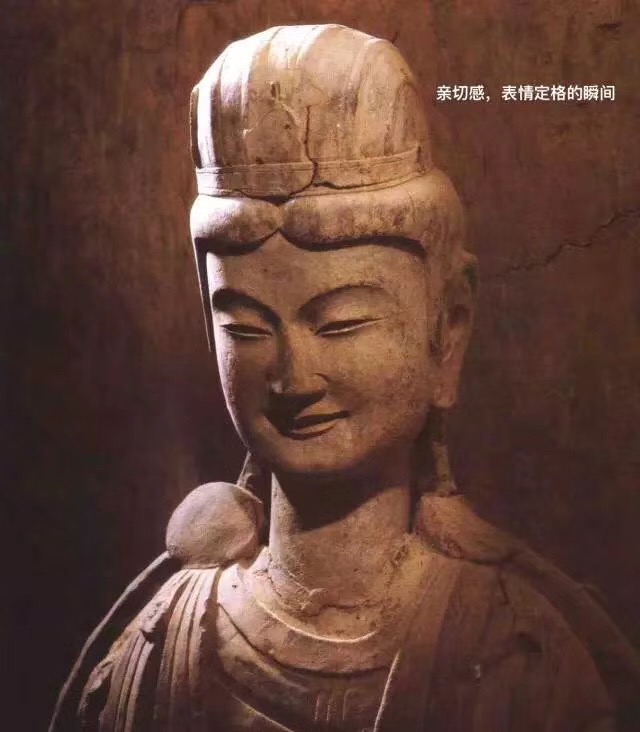
Like many of his generation, Kondo, who graduated from Brown University, said he was supportive of affirmative action. But others remain concerned that such admissions policies could be discriminatory.
[虾译:布朗大学毕业的近藤表示,像他那个时代的许多人一样,他支持平权运动。但其他人仍然担心这种招生政策可能具有歧视性。]
In New York, Mayor Bill de Blasio recently recommended changing the admissions criteria for the city’s most elite public schools, where Asian-Americans are vastly overrepresented and black and Latino students are underrepresented. Currently, the only metric for admission is a test, but de Blasio wants to allot seats to the top students from all of the city’s middle schools, which would most likely cut into the number of spots for Asian-Americans.
在纽约,市长白思豪(Bill de Blasio)最近提出了一项改变纽约最顶尖公立学校招生标准的建议。在这些学校里,亚裔美国人过多,而黑人和拉丁裔学生不足。目前,入学的唯一指标是一项考试,但白思豪希望将席位分配给全市所有中学的顶尖学生,这很可能会减少亚裔美国人的名额。

A rally in New York this month to protest the city’s plan to change admissions policies for specialized high schools. KEVIN HAGEN FOR THE NEW YORK TIMES
本月在纽约进行的一场集会,目的是抗议纽约改变特殊高中招生政策的计划。
Park said he found the plan problematic because it forced Asian-Americans to give up something instead of compelling high-performing schools that are predominantly white to integrate.
T·K·朴表示,他认为这一计划是具有歧视性的,但他并不认为这是因为对亚裔美国学生怀有敌意。他说,问题在于这是在迫使亚裔美国人放弃一些东西,而不是去要求那些以白人为主的绩优学校去进行族裔融合。
“The real conversation, I think, is why these exclusive prep schools are not under discussion,” Park said. “No matter how you try to put it nicely, this is about white people having theirs, and telling Asians and African-Americans and Latinos to fight over the rest.”
“我认为,真正的谈话在于为什么这些难进的预科学校不在讨论之中,”T·K·朴说。“不论你如何修饰你的表达,这都是白人的归白人的,然后告诉亚裔和非裔、拉丁裔去争抢剩下的东西。”
Black and Asian-American people have often been pitted against one another over the years, dating to the mid-20th century, when white people praised the work ethic and ability of Asian-Americans as a way to disparage the African-American struggle.
多年来,黑人和亚裔美国人经常被拿来对比,这可以追溯到20世纪中期,当时,白人称赞亚裔美国人的职业道德和能力,作为贬低非裔美国人斗争的一种方式。
Differences over the nature of the discrimination that each group faces remain something of a sore spot. The fact that many of the Asian-American students at New York’s specialized high schools come from poor families has been one argument raised in opposition to race-conscious admission policies.
每个群体面临的歧视在本质上的不同始终是一个痛点。纽约特殊高中的许多亚裔美国学生来自贫困家庭,这个事实是反对有种族意识的招生政策的一个依据。
But that ignores the fact that black people have been and continue to be discriminated against in highly damaging ways, such as mass incarceration, police violence and segregation, said Claire Jean Kim, a professor of Asian-American studies at the University of California, Irvine.
但加州大学欧文分校(University of California, Irvine)的亚裔美国人研究教授克莱尔·简·金(Claire Jean Kim)表示,这忽略了一个事实,那就是,黑人遭到了——并且仍在遭到——极具破坏性的歧视,比如大规模监禁、警察暴力和种族隔离。
“The question of how Asian-Americans are positioned relative to black people is a very serious and important question that Asian-Americans have not grappled with,” Kim said. “Asians in general are getting certain types of advantages by not being black.”
“亚裔美国人相对于黑人的地位是一个非常严肃和重要的问题,但亚裔美国人并没有就这个问题进行斗争,”金教授说,“总的来说,亚裔因为自己不是黑人而获得了某些优势。”
That is not to discount the ugly history of violence, racism and exclusion that Asian-Americans continue to endure. Studies have found that Asian-Americans are the least likely of any race to be promoted to management roles in the professional world. They have the highest poverty rates in some communities. And some Asian-Americans say their causes usually get little mainstream political support.
这并不是在抹杀亚裔美国人经历过并在继续经历的暴力、种族主义和排斥的丑恶历史。研究发现,在所有种族中,亚裔是职场中最难被提升到管理职位的种族。在一些社区里,亚裔的贫困率最高。一些亚裔美国人表示,他们的诉求通常得不到主流的政治支持。
That might be changing with a budding movement led by some Chinese-American activists against affirmative action. That movement took off in 2014, with a campaign that defeated a California bill that would have allowed affirmative action in the state’s public colleges and universities. The activists generally immigrated to the United States over the past 20 years from mainland China. They are mostly well-educated and often communicate through WeChat, a Chinese messaging app.
这种情况可能会被一些华裔美国活动人士领导的一场新兴运动所改变。这个反对平权行动的运动在2014年兴起,当时的一场活动挫败了加州的一项允许公立学院和大学采取平权行动的法案。这些活动人士大多是在过去20年里从中国大陆移民到美国的华人。他们大多受过良好教育,经常通过中国的讯息应用微信进行交流。
“On some affirmative action debates they are used as a wedge,” said Karthick Ramakrishnan, associate dean of the School of Public Policy at the University of California, Riverside. “But what you’re seeing more and more, Asian-American activists, specifically Chinese activists, are more than happy to play that role of wedge. They use the language of discrimination and victimhood.”
“在某些关于平权行动的争论中,他们被用来制造隔阂,”加州大学里弗赛德分校(University of California, Riverside)公共政策学院(School of Public Policy)的副院长卡尔蒂克·拉马克里希南(Karthick Ramakrishnan)说,“但你看到,越来越多的亚裔美国活动人士,尤其是华裔活动人士,非常乐意扮演这种制造隔阂的角色。他们会使用歧视和受害者的语言。”
Tony Xu, a 48-year-old Chinese immigrant, sees affirmative action as a form of racism.
48岁的中国移民托尼·徐(Tony Xu)将平权行动视为一种种族主义,称它是“歧视亚裔美国人的工具”。
Xu, who lives in Fremont, California, came to the United States two decades ago as a software engineer and owns a real estate company. He said his daughter was a rising junior in high school and planned to apply to several elite universities, including Stanford and Ivy League schools. He became politically active during the fight over the California bill, he said, and belongs to the Silicon Valley Chinese Association, which opposes affirmative action.
托尼·徐住在加州弗里蒙特,20年前以软件工程师的身份移民到美国,现在拥有一家房地产公司。他说他的女儿即将开始高中的最后一年,打算申请几所顶尖大学,包括斯坦福大学(Stanford)和常春藤盟校。他表示,在抵制这项加州法案的斗争中,他成了政治活跃分子,他是反对平权行动的硅谷华裔协会(Silicon Valley Chinese Association)的一员。
Xu said he did not see the benefit of racial diversity in schools. In China and Japan, for instance, schools are basically monoracial, but those students turn out just fine, he said.
托尼·徐表示,他不觉得学校进行种族多元化有什么好处。他表示,比如在中国和日本,学校基本上都是单一种族,但那里的学生最后都挺好。
“I believe everyone, if you work hard, you spend time, you can achieve the same goal,” he said.
“我相信每个人只要努力工作,投入时间,就能实现同样的目标,”他说。
Other first-generation Chinese immigrants see a more complex reality. Steven Chen, who came to the United States three decades ago from Hangzhou, said he believed many fellow immigrants were misled by false information in online echo chambers. Chen, a 54-year-old network administrator who lives in Irvine, California, and supports affirmative action, said he hoped to help change that, though he did not fault others for their desire to protest.
其他第一代中国移民看到了更复杂的现实。30年前从杭州移民到美国的史蒂文·陈(Steven Chen)表示,他觉得,许多移民同胞被网上回音室内的虚假信息误导了。54岁的陈住在加州欧文市,是一名网络管理员,他支持平权行动。他表示,他希望自己能帮助改变这种现状,但他并不责怪那些想要抗议的人。
“If the message sounds like we are very selfish people, we don’t care about minorities, that will be bad,” he said. But if “the message given out is reasonable, trying to solve the real issues, then it is OK.”
他表示,“如果他们给人的印象是我们非常自私,不关心少数族裔,那就太糟糕了”,但如果“他们发出的信息是合理的,试图解决真正的问题,那就没问题”。
2018.6.21




